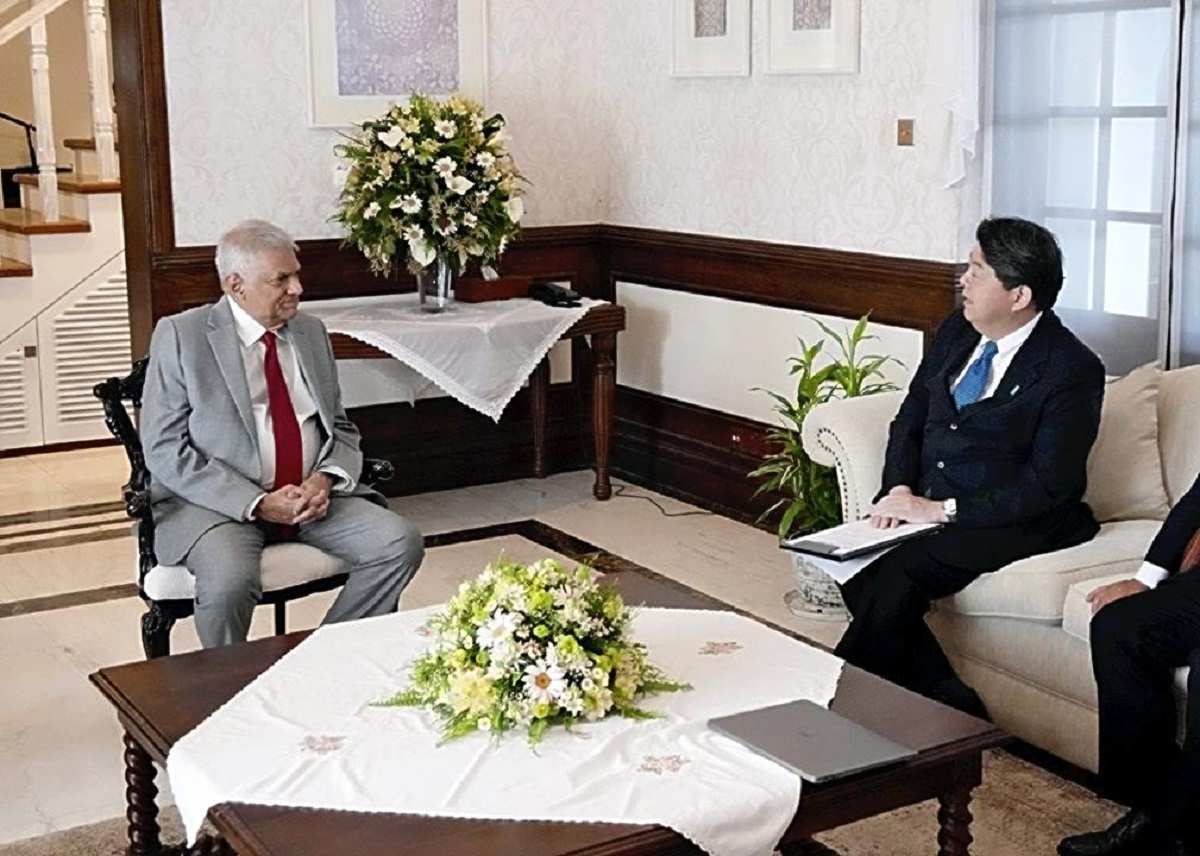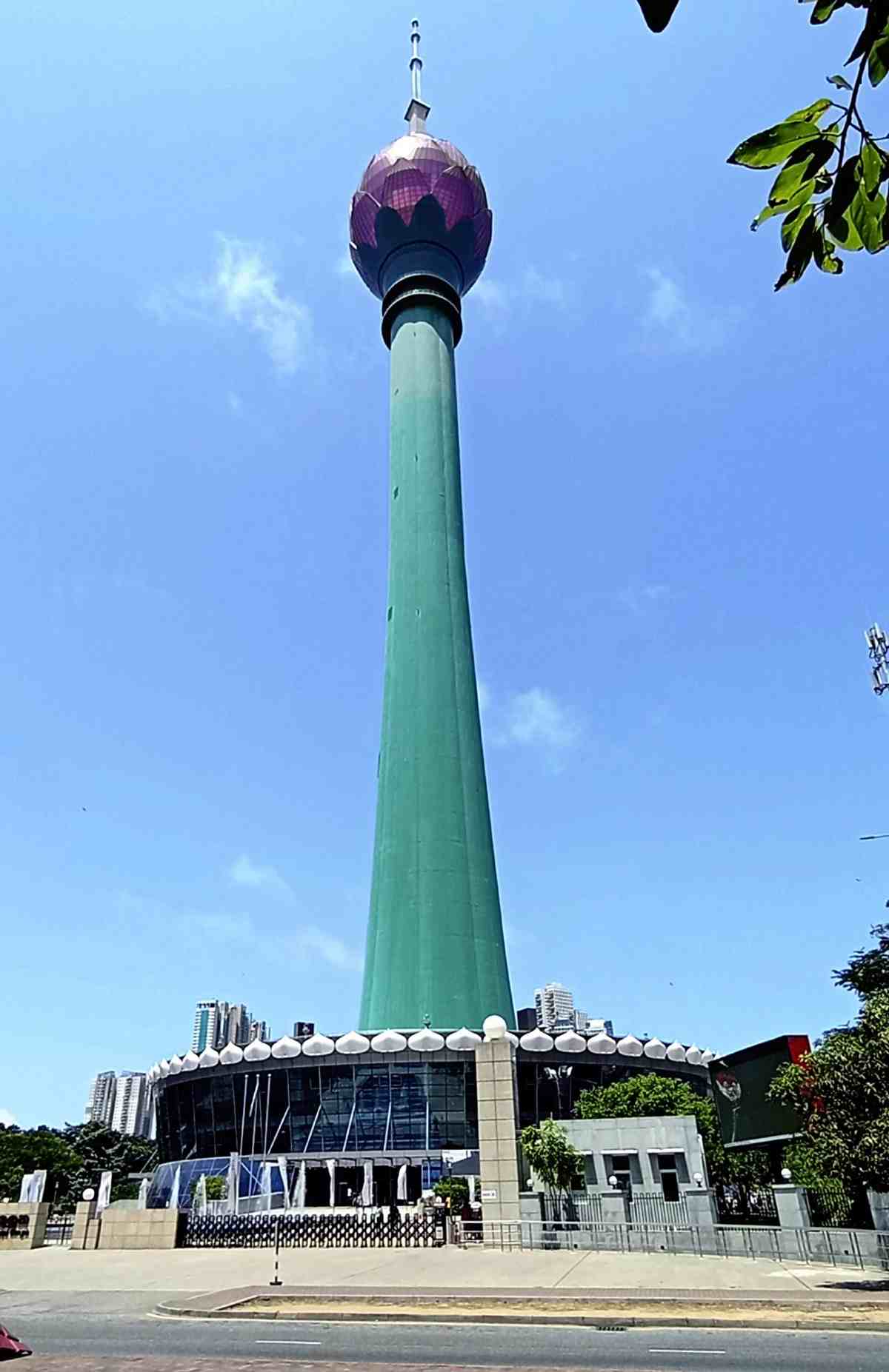
Foreign Minister Yoshimasa Hayashi meets with Sri Lankan President Ranil Wickremesinghe at the president’s private residence in Colombo on Saturday.
6:00 JST, July 31, 2023
Japan and China have locked horns over aid diplomacy to emerging and developing countries in key maritime locations. The Japanese government has condemned China’s so-called debt trap financing in which developing countries are saddled with debts and China obtains the rights to use ports and other local infrastructure.
The Japanese government aims to help such emerging and developing countries move away from their dependence on China.
Foreign Minister Yoshimasa Hayashi, who is currently on a tour of southwestern Asia, was invited to the private residence of Sri Lankan President Ranil Wickremesinghe on Saturday morning and had a meeting with him over breakfast.
Hayashi expressed his hope for further progress in Sri Lanka’s debt restructuring process and underscored the importance of transparent, fair restructuring that involves all creditor countries. Wickremesinghe replied that he would exercise utmost care regarding transparency and fairness.
The foreign minister stressed the involvement of “all creditor countries” because China does not participate in the creditor committee, in which creditor nations discuss Sri Lanka’s debt payment plans following the country’s default on its debt last year.
Japan is co-chairing the committee with France and India, and is closely watching Chinese moves so that China will not steal a march on other creditors by presenting repayment conditions favorable to itself.
Sri Lanka has a significant amount of infrastructure built with loans from China.
One such facility is the 350-meter-tall Lotus Tower, a landmark in Colombo. About 80% of its total construction costs of $88 million, or about ¥12.3 billion, was financed by Chinese loans.

The Lotus Tower stands in the Sri Lankan city of Colombo. Few people were seen around the stucture when this photo was taken July 23.
The number of visitors has topped 1 million since its opening to the public in September last year, but the local Daily Mirror newspaper reported that foreign visitors to the tower accounted for only 2% of the total. The plan was for its construction costs to be recovered through the admission fees paid by foreign visitors, which were set at 13 times the rate paid by local residents.
The Port of Hambantota in southern Sri Lanka is a prime example of a debt trap. The port was built with a huge amount of Chinese loans as one of key programs in the Belt and Road Initiative, a massive China-led infrastructure project.
But the Sri Lankan government was unable to repay the loans and handed over the rights to operate the port to a Chinese state firm on a 99-year lease.
According to Japan’s Finance Ministry, Sri Lanka had bilateral external public debts totaling $10.1 billion, or about ¥1.4 trillion, as of December. Of that figure, $4.1 billion dollars (about ¥570 billion) was owed to China, while $2.7 billion (about ¥380 billion) was owed to Japan.
Sri Lanka is geopolitically important for both Japan and China. The country is located on a sea-lane that 90% of Japan-bound oil tankers pass through. It is essential for Japan to strengthen its relations with Sri Lanka to realize a free and open Indo-Pacific, which is advocated by the Japanese government.
Sri Lanka is also considered one of the bases of China’s String of Pearls strategy, which positions the Indian Ocean as a key strategic position in the marine traffic.
Maldives, which is also part of Hayashi’s current tour, is in a similar situation. The country started its infrastructure development under China’s Belt and Road Initiative. However, its tourism industry was seriously hit by the coronavirus pandemic, leading to fears that Maldives may find it difficult to make debt payments to China.
Maldives is trying to reduce its dependence on China, and it aims to strengthen ties with Japan through Hayashi’s visit.
But Japan’s budget for official development assistance has been declining since its peak of ¥1.1687 trillion in fiscal 1997. Its ODA budget for fiscal 2023 stands at ¥570.9 billion.
“In terms of economic clout, Japan can’t beat China. It’s important for Japan to show its partners that it’s willing to get involved on a long-term basis,” said Etsuyo Arai, director of the South Asian Studies Group, Area Studies Center, at the Institute of Developing Economies, Japan External Trade Organization.
Top Articles in Politics
-

Japan PM Takaichi’s Cabinet Resigns en Masse
-

Sanae Takaichi Elected Prime Minister of Japan; Keeps All Cabinet Appointees from Previous Term
-

Japan’s Govt to Submit Road Map for Growth Strategy in March, PM Takaichi to Announce in Upcoming Policy Speech
-

LDP Wins Historic Landslide Victory
-

LDP Wins Landslide Victory, Secures Single-party Majority; Ruling Coalition with JIP Poised to Secure Over 300 seats (UPDATE 1)
JN ACCESS RANKING
-

Producer Behind Pop Group XG Arrested for Cocaine Possession
-

Japan PM Takaichi’s Cabinet Resigns en Masse
-

Man Infected with Measles Reportedly Dined at Restaurant in Tokyo Station
-

Israeli Ambassador to Japan Speaks about Japan’s Role in the Reconstruction of Gaza
-

Videos Plagiarized, Reposted with False Subtitles Claiming ‘Ryukyu Belongs to China’; Anti-China False Information Also Posted in Japan

























